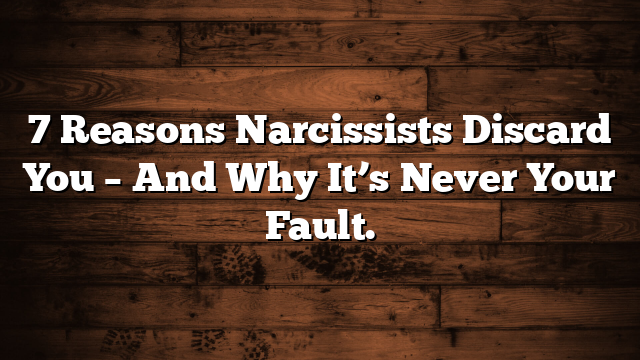7 Reasons Narcissists Discard You – And Why It’s Never Your Fault.
Why Narcissists Discard People: 7 Reasons Explained – And How to Protect Yourself
Narcissists Don’t Discard Randomly – It’s a Pattern, Not a Personal Failure
When a narcissist suddenly cuts you off—seemingly out of nowhere—it can feel like rejection, abandonment, or betrayal. But the discard phase isn’t about you being inadequate. It’s about them maintaining control. Narcissists discard people for specific reasons—each related to protecting their ego and their supply.
Behind The Mask: The Rise Of A Narcissist
Here are 7 key reasons why narcissists abruptly discard people, and what each one reveals about their manipulation tactics:
1. You Started Seeing Through Them
As soon as you question their stories, detect contradictions, or stop feeding their ego, you become a liability. They vanish before the truth surfaces, cutting ties to preserve their image. What feels like abandonment is actually their move to avoid exposure.
2. You Set Boundaries
Narcissists need control. Boundaries threaten their dominance. When you say “no”—whether it’s about respect, time, or emotional space—you become “difficult.” That shift makes you less useful to them, so they discard you to seek easier targets.
3. You Stopped Being Useful
Once you no longer serve their emotional, financial, or social needs, they discard you without empathy. Narcissists don’t value reciprocity—they value supply. When someone else offers more—or when you refuse to give infinitely—they move on swiftly.
4. You Held Them Accountable
Calling out manipulation, lies, or infidelity triggers narcissists. Accountability threatens their constructed identity. So they’ll typically discard someone right after being challenged—to punish, to rewrite the narrative, or to gaslight you into believing you were in the wrong.
5. They Found “New Supply”
Leaving isn’t always about ending the relationship—it’s about starting another. Narcissists don’t upgrade to someone better—they upgrade to someone easier to charm and exploit. As soon as they spot fresh admiration or control, they vanish with you in tow—or leave you behind.
6. Your Admiration Waned
Narcissists thrive on adoration. If you stop worshipping them or refuse to elevate their ego constantly, they feel betrayed. They expect admiration to be unconditional. Once that stops—or becomes realistic—they discard you to regain control.
7. They Want to Regain Power
Sometimes, the discard is part of a larger game—designed to exert power through absence. After pushing you away, they might reappear later (known as “hoovering”), then ask for another chance. This pattern keeps you off-balance and emotionally tied.
What the Discard Really Means
- It’s not your fault.
- It’s not a reflection of your worth.
- It’s a reflection of their need for dominance and illusion.
Being discarded often means you refused to be manipulated—maybe you questioned them, stood up to them, or stopped giving more than you could. Awareness of their tactics strips away their power.
How to Protect Yourself
1. Trust the Pattern, Not the Promise
Understand that narcissists rarely change. Their cycle—idealise, devalue, discard, hoover—is consistent. Knowing it helps you emotionally protect yourself the next time they re-emerge with apologies or promises.
2. Maintain Boundaries
Discern what behaviours you won’t tolerate—like silent treatment, disrespect, or emotional unpredictability—and enforce them.
3. Detach Emotionally
Don’t engage. Limit communication. And if calling for closure, remind yourself that they don’t value it. Their version of truth serves their ego, not your clarity.
4. Build Support
Healing doesn’t happen in isolation. Whether it’s a therapist, support group, or trusted friend, validation helps you rebuild without gaslighting.
5. Learn and Educate Yourself
The more you recognise the red flags and manipulation playbook, the less accessible their control becomes.
Why Knowing This Matters
Knowledge is power. Understanding the reasons behind the discard isn’t about blaming yourself—it’s about diagnosing their tactics. Awareness gives you clarity, minimizes guilt, and protects your peace.
Check these out!
Behind The Mask: The Rise Of A Narcissist
15 Rules To Deal With Narcissistic People.: How To Stay Sane And Break The Chain.
A Narcissists Handbook: The ultimate guide to understanding and overcoming narcissistic and emotional abuse.
Boundaries with Narcissists: Safeguarding Emotional, Psychological, and Physical Independence.
Healing from Narcissistic Abuse: A Guided Journal for Recovery and Empowerment: Reclaim Your Identity, Build Self-Esteem, and Embrace a Brighter Future
(Sponsored.). https://betterhelp.com/elizabethshaw
Advertisements
Click on the links below to join Elizabeth Shaw – Life Coach, on social media for more information on Overcoming Narcissistic Abuse.
On Facebook.
On YouTube.
On Twitter.
On Instagram.
On Pinterest.
On LinkedIn.
On TikTok
The online courses are available by Elizabeth Shaw.
For the full course.
Click here to sign up for the full, Break Free From Narcissistic Abuse, with a link in the course to a free, hidden online support group with fellow survivors.
For the free course.
Click here to sign up for the free online starter course.
To help with overcoming the trauma bond and anxiety course.
Click here for the online course to help you break the trauma bond, and those anxiety triggers.
All about the narcissist Online course.
Click here to learn more about the narcissist personality disorder.
The narcissists counter-parenting.
Click here for more information on recovery from narcissistic abuse, and information on co-parenting with a narcissist.
Elizabeth Shaw is not a Doctor or a therapist. She is a mother of five, a blogger, a survivor of narcissistic abuse, and a life coach, She always recommends you get the support you feel comfortable and happy with. Finding the right support for you. Elizabeth has partnered with BetterHelp (Sponsored.) where you will be matched with a licensed councillor, who specialises in recovery from this kind of abuse.
Click here for Elizabeth Shaw’s Recommended reading list for more information on recovery from narcissistic abuse.




